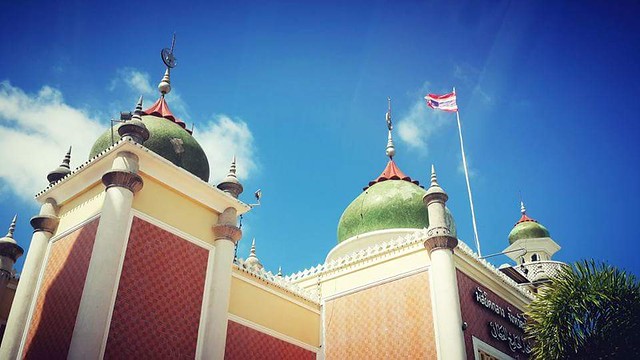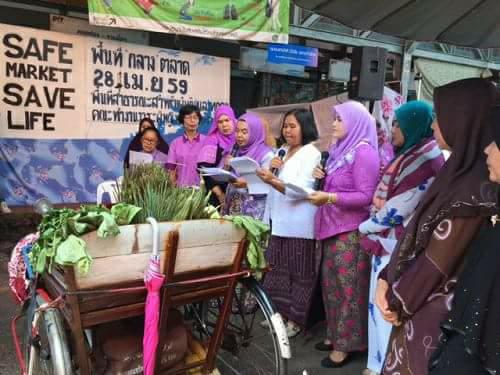“The absence of a united women’s coalition hinder[s] a collective and strategic effort to call for inclusive and gender-sensitive peacebuilding”, argues Firdaus Abdulsomad in her Master’s thesis entitled ‘Women’s participation in the Patani Peace Process : a case study of the barriers to women’s participation in building peace in Patani’ which can be read
here.
Firdaus Abdulsomad who identifies herself as “a second generation Patani Malay who grew up in Sweden” undertook her fieldwork research during the summer of 2017 in the Patani region in Thailand which is officially referred to as the Southern Border Provinces by the Thai government. Patani was colonised by Siam whose annexation was formally recognized by Britain under the
Anglo-Siamese Treaty in 1909. The thesis provides a unique insight into the dynamics of women’s rights groups operating in conflict-torn Patani - a topic almost entirely neglected outside the region.
The Pattani Central Mosque
Divided by two camps
The research uncovers the unfortunate reality of the current obstacles facing women’s groups which reflects a mirror image of the divide and mistrust in society in Patani. The thesis describes how “the conflict has resulted in a polarization of the civil society landscape”. It places women’s groups into two camps. The first are those groups which are seen as loyal to the government whereas the second camp is groups close to the Patani Malay population and are rumoured to having ties with the Patani independence movement. Both camps are faced with their own obstacles which have led to a climate of fear. Furthermore, the growing presence of international groups has added a dynamic to the landscape which has not always been for the better.
Mistrust between women’s groups is strongly connected to the source of their funding. The women’s groups which have accepted funding from the government are regarded by the opposing camp as simply an extension of the state. They are not only regarded as biased but are also seen as a direct threat to the local groups which focus on exposing state crimes such as torture and extrajudicial killings (illegal killings of people by government authorities). Furthermore, these groups tend to address issues deemed acceptable to the government which are the human rights abuses that Malay Patani separatists are assumed to be responsible for.
The other camp, on the other hand, tends to focus on crimes related to the government such as the torture of suspects accused of being involved with the separatist movement and extrajudicial killings. As a result, it is these women’s groups which face systematic harassment and intimidation from security officials. Compared to male activists in the Patani region, women's groups tend to face more psychological rather than physical threats such as frequent visits by security forces to their offices and homes and online smear campaigns. However, even groups which do not focus directly on state abuses face intimidation from state agents if they are not seen to be clearly working with the government, according to the thesis’ findings.
One of the female activists interviewed reported how she receives calls from the military inviting her to an informal, ‘friendly’ meeting. She said how she has no choice but to accept the invitation otherwise it will be interpreted that she is against the military which will cause problems for her. When she meets up with the military, the meeting feels more like an interrogation where she is asked lots of questions about her work and about the people who report human rights violations and even about her opinions on different matters.
Despite these threats many women activists face, the thesis highlights the existence of the “gendered nature of the discriminative security practices” where women are regarded as less of a threat and are therefore more likely to be permitted to access certain places easier such as visiting suspects held in prisons and detention centres.
The international factor
The collaboration of international organizations with local women’s groups has had many effects. Firstly, local women’s groups with links to international or Bangkok-based actors find themselves in a relatively less vulnerable situation. These links also provide alternative sources of funding, and much of this source of funding is for gender-related projects which were a topic which received less attention before. However, these women’s groups also face criticism as they are not seen as maintaining their independence and therefore their legitimacy in the eyes of the local population. It is sometimes felt that these groups choose to adopt the objectives of their international donors or in the worst case that these groups are simply seen as tools of foreign parties who have their own agenda for pushing for social change in Patani.
Another critique of foreign donors is their emphasis on economic empowerment rather than political empowerment according to the interviews conducted in the thesis. Most of the respondents felt that more attention was needed for creating political awareness and confidence in the women’s movement.
The latest wave of violence in the decades, even centuries old conflict in Patani since 2004 has been extremely divisive cutting down ethnic lines but also within the ethnic Malay population between those who have been assimilated into Thai society and those who retain their historical Patani Malay identity. Naturally, this explains why women’s groups from different ethnic, social or political backgrounds seldom work together. However, some international organizations have played a supportive role in establishing multi-ethnic initiatives in Patani.
The Peace Agenda of Women (PAOW)
Members of The Peace Agenda of Women (PAOW) campaign for a safe market
The Peace Agenda of Women (PAOW) is the most prominent multi-ethnic network of women’s groups operating in the region and is the only women’s peace network with links to the current peace negotiations. PAOW has received backing from several external groups including the World Bank and the Asia Foundation and is made up of 23 women’s organisations from the Malay, Thai and Chinese communities in Patani. It provides a platform for women to express their concerns and engage in the peace process as a collective voice for women. Furthermore, PAOW has publicly backed the peace negotiations between the Thai government and MARA Patani, which is a coalition of some of the Patani Malay separatist groups. It also supports the call for “safety zones” which it regards as limited ceasefire zones where both sides of the conflict agree to end the use of violence in public spaces such as markets, places of worship and schools.
Even PAOW faces criticism, however. Not all active women’s groups from the region have joined PAOW. Concerns have been raised as to whether PAOW is being used as an instrument of its donors, therefore, questioning its legitimacy. Also, PAOW’s focus on safety zones has faced criticism from other women’s groups. They argue that simply addressing the idea of safety zones neglects the existence of “invisible” violence such as the use of torture, extrajudicial killings and the censorship and intimidation of villagers suspected of being a part of the independence movement. One interviewed respondent expressed the following;
“For the people and the civil society “safety zones” mean both end of violence and human security. Practically, to be free from torture, extrajudicial killings and enforced disappearances. To be able to have the freedom of expression and say what you want without fearing reprisals. Basically, a good life, with no military on the road or knocking at your door 2 a.m. to arrest your son with no warrant. That is what people want.”
The need for a united women’s coalition
The thesis cautions against regarding PAOW as the sole representative of women’s groups in Patani because the voice of other women’s groups may be forgotten or neglected. It also raises concerns about the ability of prominent female leaders from both camps to find common ground for cooperating. Furthermore, it regards the failure to “formulate any clear overreaching strategy and vision for advocating for gender-inclusive participation... diminish[ing] the potential of a united coalition negotiating for women’s inclusion” with regards to the Patani Peace Process.
Apart from the lack of solidarity between women’s groups in Patani, other challenges the thesis raises for the women’s movement is the “exclusive hierarchy of older middle-class women at the top”... “an urban-rural divide” but also the underrepresentation of sexual minorities and marginalised women”.
Adam John is a British national who lives in Sweden and is a supporter of non-violent political activism in Patani.


